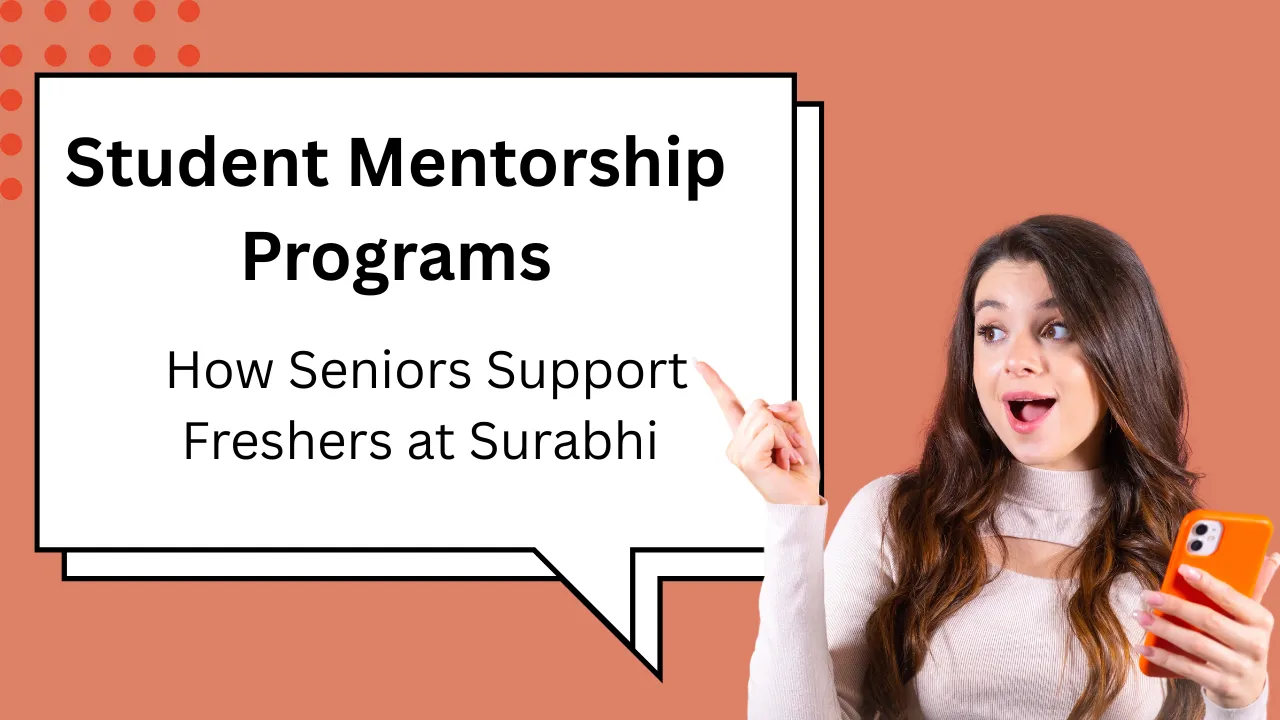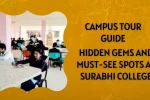Student Mentorship Programs at Surabhi: Student Mentorship Programs at Surabhi create a nurturing campus culture where freshers feel welcomed and supported. Mixes of structured guidance and friendly advice help new students settle academically and socially. From orientation week to late-night study sessions, seniors become trusted guides, easing the transition into college life and strengthening community bonds.
This article dives into how Surabhi’s mentorship system uses formal orientation, peer support, skill-sharing and emotional care to help freshers thrive. You’ll understand how academic coaching mingles with friendship, personal growth and digital tools—all forming a robust support network on campus.
Student Mentorship Programs at Surabhi: A 100–120 Word Spotlight
Student Mentorship Programs at Surabhi blend structured support with informal buddy bonds to enrich the fresher experience. Each department appoints senior mentors who provide academic guidance, study strategies, and college-navigation tips. During orientation, mentors lead icebreakers, workshops, and stadium tours. Beyond structured support, study circles, skill-based club mentoring, and peer wellness checks reinforce emotional wellbeing. Seniors share time-management hacks, exam prep templates, and balance-school-life advice. Digital mentorship platforms help coordinate meet-ups, share resources, and track progress. This layered approach fosters both academic success and personal confidence. Freshers gain a sense of belonging. Seniors learn leadership and empathy. Together, they build a supportive and resilient Surabhi community.
Overview of Mentorship Structures
| Mentorship Type | What It Includes | Timing/Frequency |
| Formal Senior–Fresher Mentorship | Personalized guidance on academics and college life | Weekly or bi-weekly during first semester |
| Orientation Programs | Campus tours, mixers, resource briefings | First two weeks |
| Buddy System | Daily peer support with logistics and social needs | Full year |
| Study Circles | Group tutoring and collaborative learning | Bi-weekly or during exam prep |
| Club-Based Mentoring | Workshops and skill coaching in student societies | Throughout semesters |
Formal Senior–Fresher Mentorship
Every department at Surabhi assigns freshers to two senior mentors. These experienced students help with lecture prep, lab scheduling, and understanding grade systems. They conduct weekly check-ins—face to face or virtual—covering topics like time management, note-taking, and finding campus resources. Seniors also introduce modern study techniques like spaced repetition, group flashcard building, and quick revision lists. The result? Freshers feel guided and confident, and mentors develop leadership skills and empathy.
Orientation Programs
Orientation week at Surabhi is more than campus tours—it’s about building connections. Seniors host interactive sessions:
- Icebreaker Mixers: Small-group games encourage new friendships.
- Campus Resource Workshops: Introductions to labs, counseling centers, library systems, and digital platforms.
- Expectation Talks: Mentors discuss exam patterns, lab work, and maintaining work-life balance.
- Club Fairs: Freshers are introduced to cultural, technical, sports, and arts societies—all guided by seniors.
This ensures freshers become familiar with their environment, meet helpful peers, and feel integrated from day one.
Buddy System
Beyond formal mentoring, each fresher gets a buddy peer—usually a senior with shared interests. Buddies answer everyday questions: how to get a lab coat, join a study group, or manage a café schedule. They also share campus secrets: which library spots are quietest or the best tea stall. Shared meals, coffee chats, or evening walks help build friendships. Over time, these casual connections become strong support networks that often last beyond the first year.
Study Circles and Peer-Led Learning
Academic support is further strengthened with study circles—peer-led review groups organized by department. Seniors host sessions where juniors ask questions, solve problems together, and break down lecture material. They use shared Google Docs, flashcards, and practice problem sets to build confidence. Mentors often lead targeted sessions before midterms and finals. Freshers gain collaborative problem-solving skills, while mentors sharpen teaching and communication techniques.
Club-Based Mentoring
Student societies at Surabhi—from robotics to drama—implement multi-level mentoring. Seniors run skill workshops: coding drills, stagecraft practice, scriptwriting sessions and more. Junior members receive hands-on coaching during projects. For instance, the Robotics Club mentors freshers in soldering, circuit debugging, and team planning. This hands-on support helps freshers learn new skills, feel part of a community, and gain practical experience early on.
Peer-Led Wellness Support
Surabhi recognizes the importance of emotional support. Senior volunteers act as peer counselors, offering a listening ear and friendly advice. Freshers can talk through homesickness, exam stress, or academic pressure. Seniors also organize group meditation, evening walks, and informal “tea therapy” sessions. They encourage usage of professional counseling services when needed. This informal wellness network helps freshers feel safe, heard, and supported at all times.
Digital Mentorship Tools
Surabhi supports mentorship via modern tools: dedicated chat groups, shared calendars, and platforms for booking mentor sessions. Mentors share syllabi checklists, study guides, and exam tips online for easy access. Regular polls collect feedback on how freshers feel academically and emotionally. These digital platforms foster connection, enable flexible communication, and keep mentorship transparent and organized.
Two Highlighted Mentorship Integration Areas
- Academic + Emotional Mentoring
Combining study coaching with mental health support ensures freshers feel both capable and cared for. - Skill Development + Social Bonding
Club mentoring helps students build practical skills while forming meaningful peer friendships.
FAQs
1. Who runs the mentorship program?
The program is overseen by the Student Affairs team, with mentors trained by senior students and faculty advisors to ensure consistency and quality.
2. How long does freshmen mentoring last?
Formal mentorship continues through the first semester. Informal buddy and club connections often extend through the full first year and beyond.
3. Are mentors trained?
Yes. Before orientation, mentors attend workshops on active listening, giving feedback, crisis awareness, and confidentiality—ensuring they support others responsibly.
4. Is mentoring credited academically?
Mentors receive leadership points or co-curricular credits. Exceptional mentors may receive certificates, public recognition, or recommendation letters.
5. How is the program evaluated?
Feedback surveys at mid-semester and end-of-year measure satisfaction and impact. Results inform training updates and program refinements.
Final Thought
Surabhi’s Student Mentorship Programs go beyond helping freshmen navigate academics—they build a supportive, caring campus. Seniors grow as leaders, and freshers find a sense of belonging and confidence. This synergy helps everyone thrive. If you’re a new student, connect with your mentor today. If you’re a senior, step up—help shape the campus culture through leadership and empathy. Together, we enrich academic journeys, foster teamwork, and build lifelong relationships. Reach out to Surabhi’s Mentorship Office now and join the movement.






